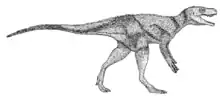欽迪龍屬
欽迪龍屬(屬名:,意為「惡魔蜥蜴」)又名慶迪龍、魔鬼龍,是蜥臀目恐龍的一屬,生活於約2億2500萬年前的三疊紀晚期。牠約有2.4公尺長,於1995年被正式命名[1]。
| 钦迪龙属 化石时期:三疊紀後期, | |
|---|---|
 | |
| 科学分类 | |
| 界: | 动物界 Animalia |
| 门: | 脊索动物门 Chordata |
| 纲: | 蜥形纲 Sauropsida |
| 总目: | 恐龍總目 Dinosauria |
| 目: | 蜥臀目 Saurischia |
| 科: | †艾雷拉龙科 Herrerasauridae |
| 属: | †钦迪龙属 Chindesaurus Long & Murry, 1995 |
| 模式種 | |
| 布氏欽迪龍 Chindesaurus bryansmalli Long & Murry, 1995 | |
| 異名 | |
| |
發現歷史
在1985年,Bryan Small在美國亞利桑那州的石化林國家公園發現欽迪龍的化石,這個化石是一個部分骨骼,包含一些骨骼碎片,與蘇牟龍的化石混合在一起[1]。這個地層屬於欽迪組(Chinle Formation),地質年代屬於三疊紀晚期的諾利階,約2億1600萬年前[2]。在1995年,這些化石被正式敘述、命名。模式種是C. bryansmalli。屬名是以其發現地附近的欽迪角而來,其名字在諾瓦霍語中的意思是「鬼」或「惡靈」;種名是為紀念化石發現者Bryan Small[3]。
敘述
到目前為止,已發現5個欽迪龍的不完整標本;如果盒龍跟欽迪龍是同種動物,則有6個標本。正模標本是最完整的標本,包含數節肋骨、脊椎碎片、兩節完整臀部脊椎、一節完整尾椎、骨盆與後肢骨頭碎片。除此之外,還發現一顆牙齒[4]。其他標本較不完整,由零碎的臀部、大腿、脊椎骨頭化石組成。
根據正模標本與副模標本,欽迪龍的身長估計約2.4公尺。
分類
欽迪龍的分類歷史非常複雜,過去曾被多次歸類到蜥臀目的不同分類位置。當化石最初發現時,被認為是屬於原蜥腳下目[5]。在1995年被命名時,欽迪龍被認為是屬於艾雷拉龍科,之後大部分研究引用這個分類[4][6]。但近年種系發生學研究認為欽迪龍不是艾雷拉龍科[7][8],可能是基礎獸腳亞目恐龍[9]、或是基礎型蜥臀目恐龍。欽迪龍同時有多種蜥臀目演化支的特徵,因此難以確定其分類位置[10]。
在德州的特髏組(Tecovas Formation)發現的一個化石,被1998年被命名為盒龍(Chindesaurus)[11]。幾年後,盒龍被歸類於欽迪龍的異名[12]。在2007年的三疊紀北美洲恐龍研究,認為欽迪龍、盒龍有許多相同特徵,其他屬沒有這種特徵。研究人員認為,這兩屬的差異可能來自於體型大小差異。但是,這兩屬的化石過於零碎,因此他們無法確定這兩屬是同種動物[13]。
參考資料
- Long, R. A., and P. A. Murry. . New Mexico Museum of Natural History and Science Bulletin. 1995, 4: 1–254.
- Litwin, R.J., Traverse, A., and Ash, S.R., 1991. Preliminary palynological zonation of the Chinle Formation, southwestern U.S.A., and its correlation to the Newark Supergroup (eastern U.S.A.). Review of Paleobotany and Palynology, v. 77, p. 269-287.
- Parker, W. G., R. B. Irmis, and S. J. Nesbitt. 2006. Review of the Late Triassic dinosaur record from Petrified Forest National Park (页面存档备份,存于). Pages 160-161 in Parker, W. G., S. R. Ash, and R. B. Irmis, editors. A century of research at Petrified Forest National Park: geology and paleontology. Museum of Northern Arizona, Flagstaff, Arizona. Bulletin 62.
- Long and Murry, (1995). "Late Triassic (Carnian and Norian) tetrapods from the Southwestern United States." New Mexico Museum Natural History Science Bulletin, 4: 1-254.
- Meyer, (1986). "D-Day on the Painted Desert." Arizona Highways, 62(7): 3-13.
- Hunt, A. P., Lucas, S. G., Heckert, A. B., Sullivan, R. M., and M. G. Lockley. . Geobios. 1998, 31: 511–531.
- Bittencourt and Kellner, (2004). "The phylogenetic position of Staurikosaurus pricei Colbert, 1970 from the Triassic of Brazil." Journal of Vertebrate Paleontology, 24(3):.
- Irmis, Nesbitt, Padian, Smith, Turner, Woody and Downs, (2007). "A Late Triassic dinosauromorph assemblage from New Mexico and the rise of dinosaurs." Science, 317: 358-361.
- William G. Parker, Randall B. Irmis, and Sterling J. Nesbitt. . A Century of Research at Petrified Forest National Park: Geology and Paleontology. Museum of Northern Arizona Bulletin. 2006, 62: 160–161.
- Irmis, R.B., Nesbitt, S.J., Padian, K., Smith, N.D., Turner, A.H., Woody, D.T., and Downs, A. (2007). "A Late Triassic dinosauromorph assemblage from New Mexico and the rise of dinosaurs (页面存档备份,存于)". Science 317: 358-361
- Hunt, Lucas, Heckert, Sullivan and Lockley, (1998). "Late Triassic Dinosaurs from the Western United States." Geobios, 31(4): 511-531.
- Langer, (2004). "Basal Saurischia." In Weishampel, Dodson and Osmolska (eds.). The Dinosauria Second Edition. University of California Press. 861 pp.
- Nesbitt, Irmis and Parker, (2007). "A critical re-evaluation of the Late Triassic dinosaur taxa of North America." Journal of Systematic Palaeontology, 5(2): 209–243.